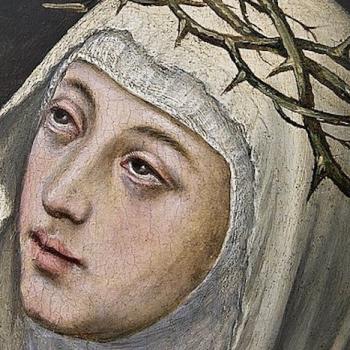
Long plane rides provide guilt free screen time. Especially headed west when, the way I see it, one’s only job is to stay awake and fight the coming jet lag. It’s just self care, really. Which is how, in between Ghostbusters and Licorice Pizza, I found myself absorbed in the life of Tammy Faye Bakker and the mysteries of the prosperity gospel.
The Bakker Story
Some of you won’t know, or will only vaguely recognize the name. Tammy Faye and her husband Jim were pioneers of televangelism in the 70s and 80s. They rose to fame and fortune with their PTL Network and then crashed hard. Jim went to prison for fraud, and admitted to using donations from viewers to silence an accusation of rape (he admits an affair and the payoff, but denies it was rape). Tammy Faye became a late night comedy punchline, especially targeted for her copious use of makeup.
The Bakkers were not from the world that I was raised in, but they were from the world next door. My midwestern holiness church looked with suspicion on glamour, expensive watches, and, honestly, loads of eye makeup. Faith healing and glossalia didn’t score high points with us either.
But these were the 80s, and Jerry Falwell’s coalition and Reagan’s victories were bringing conservative Protestants of all sorts into new rooms together.
The Blessing Question
The biopic, with the tongue-in-cheek title The Eyes of Tammy Faye, tells this story remarkably well. We see the couple emerging from a grim and joyless Bible College classroom in the early 60s. Their love of Jesus and desire to take leaps of faith and do creative ministerial work is compelling. We start to root for them as they face cruelty and judgment from their peers. (Tammy is a harlot, Jim a weak husband who can’t keep her in her place.) Her courage in bringing a gay AIDS patient to her show for an interview is especially remarkable. She affirms the man’s belief that “God loves gay men for who they are,” even while the powerful Falwell shouts about the plague of homosexuality ruining America.
The first sermon we hear from Jim tracks with what, in the half-century since, we’ve come to call the “prosperity gospel.” It’s back in the Bible College, and he begins by fumbling over his leather-bound bible. But soon enough he has launched into a passionate account of a lively faith that brings blessing and happiness. Tammy, in the auditorium seats, cheers him on.
It is, of course, the theology that will be their undoing. That “blessing” will become a synonym for their lavish lifestyle. The pledges of vulnerable senior citizens will purchase mansions, minks, drugs and sex.
Origins of the Prosperity Gospel
The prosperity gospel is a theological disease still spreading among evangelicals, from Joel Osteen to the remarkably named Creflo Dollar. There’s something very strange about its presence in American Evangelicaism. This is a religious culture otherwise attuned to the apocalptyic: the truth of God that transcends history, the rolling up of the present world like a scroll at the end of days. But the prosperity gospel allows that “scroll,” which is to say those present day social cultural standards themselves, to define the word “blessing.” We know the Christian is blessed if she is powerful, famous, and rich.
Measuring divine blessing on such standards ought to be just as strange for Christians as measuring misery by outward appearance. The Paul of the prosperity gospel’s epistles would have said, “I am in chains, and as this looks like misery to the world, I suppose there is no joy to be found in my suffering.” That, of course, is precisely not what Paul said.
The film shows us something of this theology’s origins. The sentiment itself is in fact correct: God does want us to be happy, and theologians from Thomas Aquinas to John Wesley have affirmed this. Further, in a Christian culture characterized by dour judgment, frowns of disapproval, and rigid regulations, it’s exactly what needs saying. This is why we pull for Jim, and especially Tammy, as they work to reinvent evangelicalism in the wild west days of televangelism.
The Rest of Jim and Tammy Faye’s Story
In the end, their theology and spiritual practices were not thick enough to sustain their vision. Greed, hypocrisy, patriarchy, and just simple mean-spiritedness infect their home and studio. A poignant moment near the end returns to the theological theme that unites the film. Jim, now in prison, has just signed the divorce papers. He and Tammy sit across the visitors’ table from one another, reflecting on their wild journey. Jim has what appears to be a moment of reflective lucidity. “Were we telling people,” he asks her, “that poor people are not blessed by God?”
It’s a question that could have taken them, and could take all preachers of prosperity, into a deeper engagement with the Bible and with the calling of faith. Jim’s insight, though, is a bit hard to reconcile with his actual post-prison career. He has returned to televangelism, and currently a rather white-washed biography describes his life and ministry. Astonishingly, you can even find there a shameless request for donations and love offerings.
Meanwhile, Tammy Faye died in 2007. The climactic scene of the film is one I won’t give away. But it is, in my opinion, perfectly ambiguous. Her desire for authenticity, her love of people, her fear of disapproval, her confusion of authentic God-given happiness with grand spectacle… it’s all there.
All in all, it’s quite a ride I was on, somewhere over the Atlantic last week. Thanks to my colleague Dominique, another holiness kid, for recommending it!










